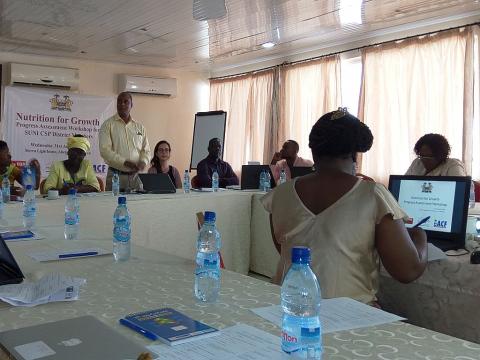By Kemo Cham
Sierra Leone should endeavor to align its nutritional targets to those of the World Health Assembly, nutrition experts and activists have urged.
While the country seems to be performing progressively in meeting its nutrition targets, it is still far behind in a number of indicators like unavailability of data to inform on the actual progress being made towards fulfilling its commitments to the Nutrition For Growth (N4G), the campaigners from the Scalling Up Nutrition Initiative (SUNI) Civil Society Platform observed.
N4G is an international campaign that resulted from a global summit on nutrition in London in 2013. That summit was designed to place the issue of nutrition on the global agenda.
Member countries which participated, including Sierra Leone, committed themselves to mainly four major targets: ensuring an enhanced nutritional status for their citizens, and in order to attain this ensuring the appropriate budgetary allocation, putting in place relevant policies that guarantee proper nutrition, and engaging local communities to ensure all these happen.
“Nutrition is key to development…Most diseases that are killing our children are nutrition related,” Mohamed Bailor Jalloh, Chief Executive Officer of the health campaign group Focus 1000, said at a workshop recently. He said child diseases like diarrhea, measles, malaria, and pneumonia, as dangerous as they were, were aggravated by malnutrition.
“These are the four major killers of children. That’s why we have to be proud of our work, and that’s why N4G is not a misnomer, because once you lack nutrition you will miss that chance to grow,” Jalloh told district representatives from the CSA platforms at the opening session of the one-day workshop held at the Sierra Light House at Aberdeen in the west end of Freetown.
It was the second in a series of workshops planned this year to sensitize stakeholders on the CSP on progress made by Sierra Leone on the implementation of the N4G three years after the London summit.
The SUN Initiative is global movement bringing together government non-state actors in partnership with a goal of addressing malnutrition.
Sierra Leone joined the movement in 2012, the same year it was officially launched in the country at a symbolic ceremony presided over by former Vice President Samuel Sam-Sumana.
The Civil Society Platform (CSP), headed by Focus 1000, is a coalition with representative groups at every district, comprising a total of over 200 organisations nationwide, which works with the government to ensure the realization of the SUNI’s goals.
The N4G generally has a commitment to prevent 20m children from stunting and save 17million lives by 2020.
At the London Summit, Sierra Leone used 2010 data as reference point in making its commitment. And since then the country has conduct only one SMART survey in 2014, noted Laetitia Battisti, Advocacy Officer of the French NGO ACF, in a detailed presentation on the country’s progress in meeting its global commitments.
ACF is one of the NGO members of the platform.
Without proper data, which requires a regular survey, Ms Battisti said, it would be hard to tell the progress Sierra Leone was making.
A major point of concern for nutrition campaigners is nutrition for children, especially babies, and particular focus is on breastfeeding. Figures from the Directorate of Food and Nutrition at the Ministry of Health and Sanitation (MoHS) show that Sierra Leone has registered progress on breastfeeding. But, say campaigners, there is much more room for improvement. Of particular concern is the very low rate of breastfeeding among working women.
Several factors contribute to prevent working mothers from breastfeeding their babies, like the unfavorable working environment. But attitude, fuelled by aggressiveness of breast milk substitute manufacturers in terms of advertisement, is also a concern among nutrition campaaigners.
The N4G summit commits member countries to design a code of marketing breast milk substitutes. This simply means to control how the manufacturing companies advertise their products to avoid harming children, said Battisti.
The plan is to have guidelines on how these advertisements are done. Some suggestions have been to have advertising milk substitutes for children under-six months completely banned.
“If we are able to regulate this, we will be promoting exclusive breastfeeding,” said Ramatu Jalloh, coordinator of the SUNI CSA Platform, under the auspices of Focus 1000.
Exclusive breastfeeding is recommended for babies up to their six month of life. Experts say within the period breast milk is the best form of feeding as it provides the exact nutrients required as well guarantee health growth.
In 2012 the Food and Nutrition directorate drafted a code which was presented in the form of a position paper to the ministry of Health and Sanitation for onward submission to cabinet. That paper, according to the platform, got frozen due to interruption caused by the Ebola epidemic.
Plans are under way to review the document and have it resubmitted.
© Politico 2016









